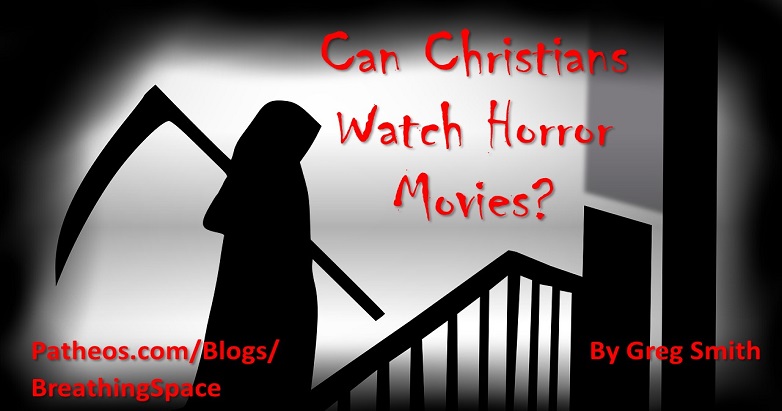Spoiler Alert: I paused my horror movie to draft this article. That first sentence sorta gives away the ending, doesn’t it? Read on, though—and we’ll take a serious look at the question.
Also, Warning: Some of the language below describes graphic violence.

Patheos asked its writers to work on a project called “People Are Asking,” tackling the top one hundred inquiries readers have about the world’s different religions. So far in this series, I’ve answered the question, “Can Christians Curse?” I’ve also addressed the question, “Who Helped Jesus Carry the Cross?” I was surprised that out of the thirty questions Patheos asked its writers to tackle, seven of them were questions asking permission. “Are Christians allowed to do this or that” seems to be a significant concern. This disturbs me because it seems too many believers are focused on permission and prohibition when Jesus came to set us free from the law. A better question is whether Christians should watch horror movies—not whether they are allowed.
Can Christians Watch Movies?
The question of yesteryear wasn’t “Can Christians watch horror movies?” but, “Can Christians watch movies?” Most of us are too young to remember the days when preachers excoriated their members from the pulpit when they were caught going to the picture show. Prohibitions against motion pictures were as serious as “thou shalt not dance” and “thou shalt not play cards (regardless of gambling).” Eventually, pastors identified more “serious” societal sins, and pointed their fingers at grosser violations. Perhaps they realized that movies are just stories, and the Bible is full of stories.
Horror Stories in the Bible
Many of the stories you find in the Bible could be horror movies if made into film. They have all the earmarks of horror movies—and not all of them have happy endings.
- Think about it—in the tale of Noah’s Ark, God (you know—the One who loves the whole world) sends rain to drown every human except eight, and every animal except two of each kind. That’s pretty much the worst horror story in the world.
- The Exodus is filled with horrifying plagues, sorcerers, animal sacrifice, and the Angel of Death. It ends well for Israel, but it’s a horror story for every Egyptian.
- Then there’s Daniel in the Lion’s Den—Sure, Daniel gets out alive, but his enemies get torn to pieces in the end.
- In the story of the Fiery Furnace, Shadrach, Meshach, and Abednego get out alive, but several innocent guards get burned up in the process.
- Don’t forget David and the Giant, where the heroic character sinks a stone into Goliath’s forehead and then chops off his enemy’s head with the giant’s sword.
- The Book of Revelation probably rivals Noah’s Ark in terms of horror. I’ve known people who told me they couldn’t sleep at night after reading that terror-thriller.
Most of these stories have been made into movies. Strangely, many have been made for children. They’ve been sanitized, with cute animals and rainbows. But let’s not forget how many horror stories are in the Bible. Christians who read scripture get exposed to tales of terror every day. What makes them “horror” is a matter of perspective.
Narnia vs. Harry Potter
Many Christians are opposed to movies that have magic in them. I’m still amazed at how many Christians are opposed to Harry Potter because of magic but love the Narnia movies, which are full of magic. Depending on the sensitivity of the viewer, these could be classified as fantasy or as horror. Perhaps these believers support Narnia because C.S. Lewis was a theologian, and his books were designed as Christian allegory. Lewis fans often love Tolkien also—they justify this because the two authors were friends and brothers in Christ. But both movies portray people and other creatures hacking each other to pieces. So, is it the presence of magic that makes a story bad? Or is it the faith or faithlessness of the book’s author that makes it taboo? If the book’s author is a believer, does the director have to be a Christian, too? Or maybe it’s whether the movie is shown on PureFlix… It’s all getting as fuzzy as the hair on a hobbit’s toes.
“Christian” Horror
Some movies could definitely qualify as “Christian” Horror. Take, for example, the Passion of the Christ. Any other movie with an R rating, which depicted one man slowly tortured to death for a couple of hours on screen would have had Christians protesting at the box office. But if it’s Jesus, it’s ok, right? What about the Left Behind movies? Those will keep you up at night! At least with most horror movies, you know it’s fantasy—but millions of viewers bought into the idea that God might leave them behind and force them to endure the Tribulation. Who is scarier—Voldemort or Nicolai Carpathia? Ted Dekker and Frank Peretti are master Christian novelists—and some of their works are now appearing on film. Their works are truly terrifying and could rival movies like Friday the Thirteenth, Nightmare on Elm Street, and Saw.
What Qualifies as a Horror Movie?
The lines get a little blurry when you ask what qualifies as a horror movie. What is the difference between fantasy and horror? Often, it’s not the content, but the camera angles, music, and special effects that determine how frightening a movie is. There’s a technical difference between a PG-13 and an R movie that usually involves certain curse words and their frequencies, gore, splatter, and other factors. But Desert News says there’s really very little difference. It’s more of a subjective thing than anything else. Every Christian has their limits—and you have to know yours.
Everyone Has Their Limits
Christians need to know their personal limits; Christian parents need to know their kids’ limits. Here are a few things to consider:
- How sensitive is the movie audience? Some people are more sensitive than others. Be mindful of whether you’re letting a child watch things that are too frightening for them—I learned this parenting lesson the hard way, and traumatized my oldest child by letting her watch The Ring when she was too young. Others are extremely sensitive, regardless of their age. Just because you’re an adult, that doesn’t mean you can handle horror movies. Every person has a different level of sensitivity.
- What time is it? The time of day might matter. I know folks who can watch horror movies and go right to bed at night. Others can’t watch them at all. Still others can watch them but need to watch a comedy or something light before they drift off to sleep.
- What type of scary is it? My personal limits involve the extremity of violence, the style of violence, and even the time period of the film. I’m not bothered too much by quick violence (decapitations, battle splatter), but lingering gore like disembowelment (think, D-Day scene of Saving Private Ryan), and torture scenes really disturb me. Also, for some reason, I can handle watching violence from any time in history (unless it’s lingering gore or torture), up to the twentieth and twenty-first centuries. If it feels “too modern,” then it feels “too real” to me. Once you get into the realm of sci-fi violence, I’m okay with it again. Maybe you have limits of your own.
- Some things you can’t unsee. If it lingers in your mind, if it causes you to lose sleep, if it leaves you with a nasty feeling (like at the end of Passion of the Christ)—maybe it’s better that you not watch it. This goes for any genre, not just horror. It’s not about whether a Christian is allowed to watch something that IMDB calls a “horror movie,” but whether a believer should watch something that is going to haunt their mind in a negative way.
Think About These Things…
The apostle Paul writes, “Finally, brothers and sisters, whatever is true, whatever is honorable, whatever is just, whatever is pure, whatever is pleasing, whatever is commendable, if there is any excellence and if there is anything worthy of praise, think about these things (Philippians 4.8 NRSVUE).” This means there are no limits in terms of exact movie ratings or genres that you as a Christian must avoid. But there are things to feed your mind with that may be healthier for you than others. It’s best to dwell on the things that build you up. You have to know your limits, and your kids’ limits, if you’re a parent.
Paul writes in 1 Corinthians 10.23 NRSVUE, “All things are permitted,” but not all things are beneficial. “All things are permitted,” but not all things build up.” It’s not about asking whether Christians are allowed to watch horror movies, but about what builds you up. It’s kind of like the old adage, “If it hurts when you do that, don’t do that.” If watching horror movies is hurting you, maybe it’s best to avoid them.
When Horror Movies Are Okay
It’s about time for me to wrap up this article and get back to my horror movie that I paused. After all I’ve said about horror movies, I do think that there’s a time and a place for them. Sometimes you just need to wind down and watch something ridiculous—something that’s far removed from everyday life. The particular film I’m watching is a mixture of horror and fantasy. It was made in Russia and dubbed in English. It has poor production quality, stilted acting, and bad special effects. It’s a movie to laugh at, more than a movie to terrify.
Sometimes horror movies are a way to laugh in the face of evil, to mock danger, and to remind yourself that compared to these fictional characters, your life isn’t that bad. Christianity is (to some degree) about good defeating evil, and some scary movies are great at reminding you of that. Even if they aren’t specifically Christian movies (whatever those are), some scary movies do a great job of depicting victory over darkness. Within limits, they can make us ask, “Where, O death, is your victory? Where, O death, is your sting (1 Corinthians 15.55 NRSVUE)?”
Oh, and One More Thing…
Maybe it’s best for Christians to stop asking if they’re allowed to do this and that. You’re going to get a different answer from every spiritual teacher. Life in Christ isn’t about a list of rules to follow. Jesus said the Holy Spirit will guide you into all truth (John 16.13). Let the Holy Spirit help you discern what’s helpful versus harmful, wise versus foolish, loving versus unloving. But if you must continue to ask whether you’re allowed this thing or that thing, you might want to read my article, “Is It a Sin to Get Tattooed and Pierced?” You might also like, “Can Christians Use Muslim Prayer Beads?”












